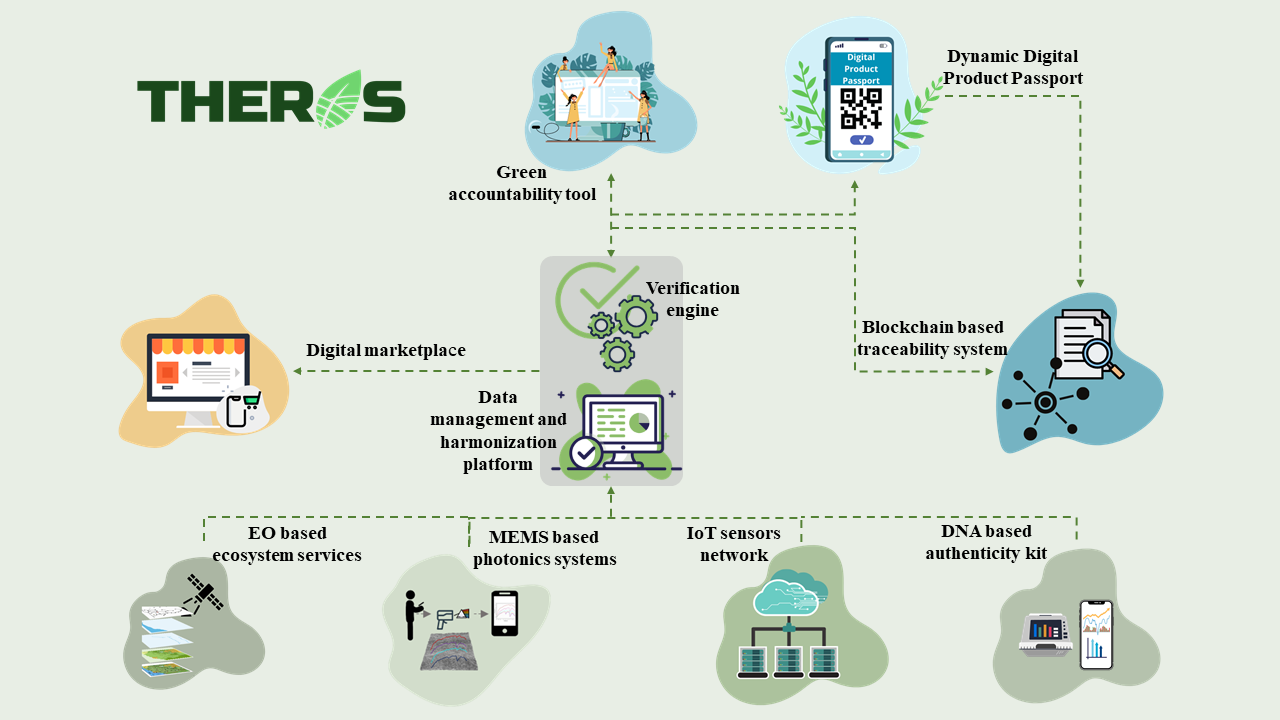THEROS aim
THEROS aims to implement an integrated toolbox capable of:
- modernising the process of verifying organic and geographical indications food products and
- preventing adulterations and non-compliances,
through the use of various technological innovations and data sources,
- while demonstrating enhanced security, transparency and interoperability in the quality labelled food supply chain.
THEROS concept
To increase sustainability, safety and health in the EU systems in a continuously volatile landscape of reduced resources and environmental changes, it is essential:
- to improve the transparency of the entire food supply chain and
- to boost the verification and quality of products by adopting multidimensional and integrated approaches.
In this context, THEROS aims to apply employ a scalable and integrated toolbox, being formulated on the basis of a multiactor approach, that will:
- address the different cases of adulteration that strike quality labelled food products (organic and GIs), whilst at the same time
- ensure incrased traceability, trust and security.
The following figure provides an overview of the overall project concept and further details about the key considerations and methods that underpin each component are presented below.

EO based ecosystem services
EO based area monitoring approaches applied in the context of CAP compliance monitoring will be extended and properly configured in the context of THEROS so as to enable large-scale monitoring and verification of organic farming practices. The approach will rely on ML-powered “markers” and human-readable “business rules”, essentially constituting records of what is observed by the satellite signal, that reflect the behaviour or a (provisional) status quo in the bio-physical manifestation of feature of interest.
THEROS EO based services will also include another facet, allowing the extraction of key biophysical parameters that will ensure effective monitoring of the organic crop conditions variability and phenological stages, in both space and time. ML methods will be applied to model these data and subsequently provide recommendations on the optimal conditions for organic crop development (i.e. use of nutrients) in order to improve soil fertility performance.
MEMS based photonics systems
THEROS introduces an innovative toolbox, employing spectroscopy principles to detect the existence of substances inappropriate to organic farming according to European Union regulations. A field-deployable Vis-NIR scanning system will enable control and certification bodies and authorities to identify concealed usage of such mixtures and provide evidence of organic product mislabelling through a red light/green light system. The miniaturized and cost-effective Vis-NIR spectrometer will be field deployable and operated according to a simple usage protocol based on the “point-and-shoot” method and specifically it will collect the required data through a one-button operation of a standard smart device (e.g., smartphone or tablet).
IoT sensors network
A network of suitable IoT sensors will enable a combined monitoring of both, climatic conditions during transport and the registration of individual types of goods during loading and unloading. QR codes and RFID chips will be used for marking the organic food assets (both transportation boxes and individual assets). Temperature and humidity monitoring sensors, door opening and closing sensors, a sensor for reading the printed or electronic code of the goods and camera feeds will be included in the network to monitor the goods during transport. The network shall include a localisation module and an autonomous telemetry station supporting the collection of data from sensors and their transmission to the server via GSM.
DNA based authenticity kit
The system will rely on a synergistic framework that will employ both DNA barcoding and metabarcoding techniques. A portable device will be used for the extraction DNA profiles from different samples which will be analysed both by standard DNA Barcoding regions (COX1 or ITS1 and16S) but also by genomic analysis using Next Generation Sequencing approaches in order to allow the development of unique molecular signatures for the food asset. Further to that, metabarcoding techniques will enable the extraction of the profile of the microbial communities living in the specific area of interest, an essential element for the identification of the origin of the product.
Blockchain based traceability system
THEROS will ensure improved traceability and transparency in the quality labelled food supply chain while leveraging blockchain technology. The THEROS blockchain traceability system shall relay on Hyperledger Fabric as blockchain base product allowing for deployment of private (permissioned) blockchain networks using open-source technology and optimized for virtual assets management.
Dynamic Digital Product Passport
The transparency and integrity of the information associated with the organic and geographical indication food supply chain will be further improved through the implementation of a Dynamic Digital Product Passport. The solution will include a mobile application with user-friendly interfaces allowing supply chain actors for rapid assessment of the status of the quality labelled food asset via scanning the product’s identification number or label and communicating efficiently the associated parameters. Apart from the above, the solution will support the execution of secure business transactions between the supply chain actors (i.e. producer, packagers, transporters, wholesalers) and shall provide also the main user interfces for the blockchain based traceability system.
Data management and harmonization platform
THEROS aims to address the heterogeneity and variability of the various data sources used for monitoring, verification and traceability through the implementation of a data management and harmonization platform. The platform shall provide the needed APIs in order to allow the retrieval of the data provided by the different THEROS components while supporting their seamless integration.
Verification engine
THEROS verification engine for organic and geographical indications food products will harness all the available data concerning the food asset and perform rule-based validation in line with the various business, technical and regulatory requirements. The applied business logic will serve the requirements of both supply chain actors and control and certification bodies (and essentially consumers) towards addressing claims and validating transactions and status of the food asset across the supply chain.
Green accountability tool
The tool consists of webbased interfaces that facilitate access and visualization of the resources managed by the data management and harmonisation platform, while also supporting interactions between users and efficient provision of recommendations. Map-/spatial-based search along with filtering criteria will be offered, enabling retrieval of spatial data and overlayed visualization according to features of interest. Intuitive visualization will support the role of control and certification bodies in eliciting information so as to decide on supply chain actors’ compliance with existing regulatory provisions, based on a traffic light system. The tool will include a reporting component, that will enable the generation of aggregated reports.
Digital marketplace
Fostering short trade circuit and increasing the market share of organic food is one of the EU’s goals for the near future. THEROS will seek to contribute to this goal by creating a business platform – a digital marketplace that will bring together regional producers, enabling the promotion of their organic food and products and at the same time make it easier for interested parties to purchase these goods.
Pilot Demonstrations

Pilot 1
Adulteration prevention of processed quality labelled food products

Pilot 2
Adulteration prevention of fresh/bulk organic agri-commodities

Pilot 3
Data driven business model for organic food fraud/adulteration prevention

Pilot 4
Adulteration prevention of geographical indication food products



